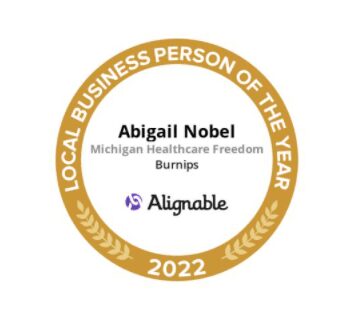BLOG
Lansing Battles over Biologics
Ever notice how two people can read the same words and come away with opposite meanings? I watched that spring to life in the House Health Policy Committee on October 27, 2015 in a dispute over medications. Horrendously expensive Biologic Drugs ($1000+ per dose for some) are starting to come off patent, and less-expensive Biosimilars are coming down the pike. Of these Biosimilars, the FDA will clear some for Interchangeable status – like generics.

The question before states is whether to allow pharmacists to substitute Interchangeables when filling a Biologics prescription, the way generics may be substituted for brand-name medications. Some say Yes, just follow FDA guidelines that recommend it; others say No, additional requirements for physician notification must be written into MI law to ensure safety. For thousands of patients, life-changing medications may soon become more affordable. For manufacturers, that high per-dose price translates into Big Money at stake over every decimal point of marketshare.
The lines had been drawn at last weeks’ Health Policy Committee Meeting. Standing on the side of less regulation were pharmacists, large dispensing pharmacies, Michigan Associated Health Plans, Spectrum Health, and MI Retailers representing their storefront pharmacies. Standing for the more-regulative option were global patient access groups, a few county medical societies, and pharmaceutical Biologics manufacturers such as Amgen and MichBio. So-called “patient groups” (more about that later) representing diagnoses such as Epilepsy, Muscular Dystrophy, Rheumatoid Arthritis, Lupus, Colon Cancer, and Cancer in general, ranged on both sides of the issue. Each side has a bill they prefer; the first bill introduced was under consideration today.
The language seemed fairly clear there on pages 5 and 6 of the bill:
(1)… A PHARMACIST WHO RECEIVES A PRESCRIPTION FOR A BRAND NAME DRUG PRODUCT OR A BIOLOGICAL DRUG PRODUCT SHALL DISPENSE A LOWER COST GENERICALLY EQUIVALENT DRUG PRODUCT OR LOWER COST INTERCHANGEABLE BIOLOGICAL DRUG PRODUCT IF AVAILABLE IN THE PHARMACY….
(3) IF A PHARMACIST DISPENSES AN INTERCHANGEABLE BIOLOGICAL DRUG PRODUCT UNDER SUBSECTION (1), THE PHARMACIST SHALL INDICATE THE INTERCHANGEABLE BIOLOGICAL DRUG PRODUCT NAME AND THE FULL NAME OF THE MANUFACTURER, IF AVAILABLE, OF THE INTERCHANGEABLE BIOLOGICAL DRUG PRODUCT DISPENSED ON THE FILE COPY OF THE PRESCRIPTION.
Yet a pattern emerged as people stepped forward to testify. Those who opposed the bill criticized it for allowing pharmacist substitution of Biologics with Biosimilars. Not so, said supporters– only those particular Biosimilars approved by the FDA to be Interchangeables were permitted to be substituted. Up would come the next bill opponent, repeating support for the other bill and expounding upon the necessity to protect patients and keep doctors informed of which drug is dispensed. The Chair patiently repeated his request to speak only to the bill under consideration. I began to wonder if opposition had gotten the wrong bill. Surely no one would stick to a narrative that had been refuted numerous times before their very eyes, unless they had a solid reason to do so… would they?
My testimony card was the last to be announced:
“Abigail Nobel, who partially supports and partially opposes the bill.” A titter went around the room, and I had to smile. Okay, so it was unorthodox. But I really did partially support and partially oppose the bill.
My Testimony:
My name is Abigail Nobel. I am a bachelors-prepared nurse with a masters in politics. My interest here today as a health policy nurse is in state-level policy that impacts patient access and healthcare costs. Biologics constitute one third of drugs dispensed nationwide.
Thousands in MI are currently using them; many more could benefit if they were more
readily available and affordable. Having read both bills, I believe HB 4437, despite some clarity issues*, does best represent patients’ wishes, and their best interests.
Access problems related to price have been addressed in previous testimony. In context, Healthcare inflation has risen faster than the US Consumer Price Index for nine of the past ten years, exceeding it by 3.2% for the first five months of this year. This is due primarily to high regulation and low levels of competition, according to Forbes.
The committee has heard about FDA guidelines for pharmacists to be able to substitute Interchangeables, their safety, and the likely dramatic savings from the generic effect of substitution.
Specific to this bill is a brief FTC [Federal Trade Commission] quote from the Commerce Committee hearings for the original Biologics Act, showing the Congressional information available at the time, which assumed there would be no substitution in the Biosimilar market:
“… market dynamics will contrast sharply with the market dynamics of generic drug competition, where lower-cost generic entry plus automatic substitution lead to rapid erosion of the branded drug’s market share. When the first generic drug enters the market, it generally offers a 25 percent discount off the branded drug’s price. As additional generic firms enter, and often there are 8 or more of them, the price discounts reach as high as 80 percent.”
That’s a lot of savings. Of course, most do not expect the percent to be as high with Interchangeables. However, early this year, upon the first FDA panel’s approval of an Interchangeable, some predicted up to 90% savings with biosimilars if pharmacists are allowed to substitute. A 2011 Rand study predicted that biosimilars would lead to a $44.2 billion reduction in direct spending on biologic drugs from 2014 to 2024, with the caution that actual savings will hinge on the level of competition.
The second area of access is where I believe I have new testimony for you today; that is, access problems related to the regulatory burden. There are two ways to approach health policy that have been called fortress and frontier. We are used to thinking of the bad things that can happen, and making laws, rules, and regulations to guard against them. That is the fortress mentality. The problem is that not all the solutions are inside the fortress.
Every day, hundreds of MI residents awake to face symptoms for which they have no effective treatment. Treatment can be complicated by individual patient variation in metabolism, blood type, genetic makeup, and other physical characteristics. Especially in the area of Biologic drugs, trial and error are the norm in the quest for the ideal plan of care for individual patients.
It is impossible to centrally master the immense quantity of data needed to determine what is best for each of these thousands of individual patients, while eliminating all risk of failure or unintended effect. The good news is, patients do a pretty good job of figuring out what does and does not help them. The difficulty these days is for them to convey their feedback to the prescribing physician, who spends up to 70% of his time meeting regulatory requirements.
I’d like to conclude by reading into the record testimony from a patient remarkable both for the severity of her disease, and for her spirit in fighting for her right to access the medications that allow her to live as normal a life as possible. Diana Brown had hoped to be here today to speak for herself, but is instead honoring a work commitment—itself a tribute to the effectiveness of this class of medications. I hope you can hear the passion of her words as she speaks for the many other patients who will benefit from an open-door health policy in MI, to free competition and reduce health cost inflation.
[Due to time limits during the meeting, I excerpted Diana’s letter in testimony and later submitted the complete letter for the record. I insert the entire letter here.]
To whom it may concern:
My name is Diana Brown and I am 33 years old. I was diagnosed with rheumatoid arthritis in 2010. The next 5 years would be a revolving door of pain, medications, and doctors offices. I started taking biologics in October of 2011 after all other treatments had failed miserably. I fully understood the side effects and possible things that are all associated with taking a biologic medicine. The first biologic took me over 2 months to finally get; due to all the paperwork that my rheumatologist had to fill out just so that my insurance would allow me to take the drug.
They really are very highly regulated. [Aside to the committee.]
That was Humira. A drug that most people have heard of due to the commercials on television. I was losing hair and throwing up for hours daily the first 2 weeks that I took the medicine. Then, came the time to give myself another shot. Now I know that many of you are asking why I would even take a drug that caused these side effects. My life was a day to day thing. I couldn’t work and most days were great if I even could walk when I went to get out of bed. My children had to help me get dressed and do things around the house. My husband was having to do more things and even help me bathe.
Biologics were my only hope. After the first biologic did nothing but make me sick we went to the next, and the next, and the next. Each with its own side effects, and most not helping me at all. Now when I say side effects I don’t mean throwing up each time. In fact, I have gone into anaphylactic shock 2 different times when receiving an infusion, and had to quit 2 other biologics because my system decided that it could have me develop issues breathing on 2 others. Yes, side effects are a part of life for me. All 3 different biologics that caused breathing issues for me worked though. That’s the saddest part. I could plan things, do activities with family and friends. Start working again even!
So, now I am on Orencia. Again, a drug most people have seen commercials for. It doesn’t work quite as well as a couple others, but I can work and live a pretty normal life. Except for every 6 months when my insurance company wants my doctor to spend 30-45 minutes on the phone with him to make sure that I “really still need this biologic medication.” This can delay me being able to get my biologic for 2 months. So, for 2 months I slowly have the medicine leave my body and the excruciating pain start again. All because of restrictions on this medication.
I understand the risks. I know the side effects too well. I have to give myself a shot into my stomach every week. Not because it is fun or I enjoy it. I do it so that I can be a mom, wife, and friend. So that I can have a life that most people take for granted. PLEASE, please do not make it harder than it already is to get these drugs. Without them I have a life, yes; but not one that anyone should have to live!
Thank You for listening to my story.
Diana M. Brown
Disease seems likely to keep researchers, physicians, and patients guessing well into the future. The greatest health for the greatest number of patients lies in the greatest number of treatment choices available. I believe the best role of regulators is to get out of the way and maximize patient autonomy. What may seem a minor regulation and reasonable safety precaution in Lansing can be harmful when its effect is multiplied upon hundreds of physicians and thousands of patients across our state. I ask the committee to reject any burden of time, documentation, or data-collection that is not absolutely required under current federal law. Thank you for hearing my testimony. I am happy to answer any questions.
[Conclusion of testimony]
*Audience laughter here at the expense of those who (seemingly deliberately) misrepresented the bill language was, I thought, well deserved. But my primary meaning was actually improvement for other segments of the bill, and I clarified that with the bill sponsor at the first opportunity.
So What Happened to the Bill?
Naturally, the issue is complicated by politics. There was no committee vote on Tuesday. Why? Two opposing bills on this issue had been introduced and assigned to the same committee. Two opposing bills— by Republicans. Both of whom are members of the committee. You see the problem: who wants to risk alienating a fellow committee member by voting against his bill? It can mean losing his support for your bills well into the future. I don’t envy the Chair as he polls the committee for their votes before next week’s meeting. The results will determine whether the first bill is released for a floor vote, or whether the second bill proceeds to committee hearing.
In the end, both bills died in committee, and a fresh bill with other barriers passed and was signed into law in 2018.
1 Comment
Submit a Comment
You must be logged in to post a comment.
Join the bridge to the other side
– shine the light of freedom in your community.
Sign Up for MHF Insights to keep up on the latest in Michigan Health Policy




Again, we watch as the bureaucrats further their power over treatment. It is best we allow for patients to decide what they wish to buy and let buyer beware, not buyer do as i say.